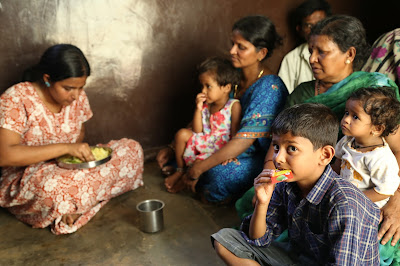Grandmother's Red Can
It’s an ordinary day
in my village.
 I’m waiting out the
scorching afternoon heat, trying to take a nap on the cool cement floor of my
grandmother’s house. The stillness all around has lulled my two-year old cousin
sister to sleep in the sari cradle that hangs from the wooden rafter in the
centre of the room.
I’m waiting out the
scorching afternoon heat, trying to take a nap on the cool cement floor of my
grandmother’s house. The stillness all around has lulled my two-year old cousin
sister to sleep in the sari cradle that hangs from the wooden rafter in the
centre of the room.
But suddenly, the
little girl lets out a wail as her peaceful slumber is broken by the loud,
urgent cry of the scrap dealer passing by. “Old steel vessels. Paper. Broken
parts,” he repeatedly calls out in a sing song manner that is strangely
pleasing to the ear.
“Tell him to wait,” my
grandmother instructs my brother and hurries to the rear of the house where a
pile of discarded materials is heaped.
I eagerly follow her
and help rummage through the dusty collection of odd items -- a deflated cycle
tyre, a dented coffee pot, a broken ladle, my uncle’s rusty shaving kit, several
of my used notebooks from college, and a pair of torn rubber slippers. “He
weighs the paper in kilos. Sometimes he gives you new vessels in exchange for
the old ones,” my grandmother says, as she greedily sorts through our waste.
“Do you want to give
away this?” I ask in disbelief, pointing to a light red plastic can that she had overlooked
in her excitement at selling my notebooks in exchange for money. I can sense
her hesitancy as she peers quietly for a moment at it with her single good eye,
debating whether to part with this can that had been a loyal companion to her
for more than thirty years.
I still remember those
evenings when village folk, both young and old, and men and women, would stop
by our house to buy liquor from my grandmother after a long day of toiling as
coolies on landlords’ fields. Afraid of letting the men into her house where
her young, unmarried daughters lived, she would always stop them at the doorstep
and tactfully finish the transaction.
Grandmother would carefully
measure the quantity and pour them a glass of liquor from the red can before
collecting the precious coins they handed over to her. She’d send them off
after letting them taste her homemade lemon pickle. I wondered whether the
pickle was a business trick to attract customers or it was done out of pity for
those poor souls.
“I saved every penny I
earned from the liquor business to send your uncles and aunts to school and
feed and clothe them. I didn’t waste money. I built this house with my savings,”
she’d often say when our conversations turned to our family’s interesting past.
I never fail to notice the pride in her voice when she speaks of the days when
she single-handedly ran the liquor business against all odds -- the risk of
getting caught by the police for engaging in an illegal trade, or fighting out
the strong competition from neighbours who too engaged in the same business.
Grandfather once
teased her for always sleeping with the can right next to her head at night, almost as though she was afraid of having it stolen from her. In
retort she said, “This is what keeps our stomachs full. Not what you earn from
selling firewood.” Her reply silenced him instantly with the truth in her words.
Having grown into the matriarch of the family, she’d built a reputation for
herself as having a tongue that was as sharp as a sword.
“Don’t sell the can. I
want to show it to my future children too. Our family history is in it,” I say,
ending her struggle to make a decision. I put the can aside. Grandmother nods
her head and smiles affectionately at me. I would never want to forget our
roots.
The scrap dealer approaches
us and we get busy trading the old for the new.



Comments
Post a Comment